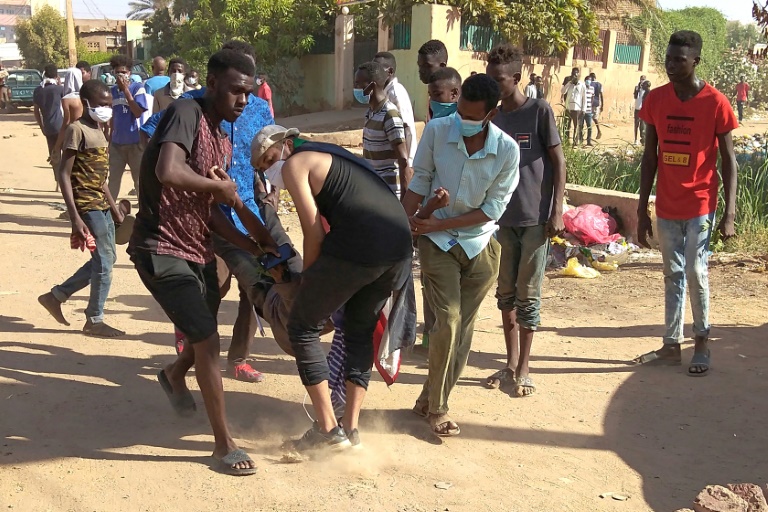Street clashes again shook Sudan’s capital Thursday a day after security forces shot dead 15 protesters in the bloodiest day since the military’s October 25 takeover.
Police fired tear gas to disperse dozens of anti-coup protesters who had stayed on the streets of north Khartoum overnight, braving an intensifying crackdown that has drawn international condemnation, witnesses said.
Police tore down makeshift barricades the protesters had erected the previous day.
Top general Abdel Fattah al-Burhan — Sudan’s de facto leader since the April 2019 ouster of longtime president Omar al-Bashir — detained the civilian leadership and declared a state of emergency on October 25.
The move upended Sudan’s fragile transition to full civilian rule, drawing international condemnation and a flurry of punitive measures and aid cuts.
“We condemn violence towards peaceful protesters and call for the respect and protection of human rights in Sudan,” the US State Department’s Bureau of African Affairs said on Twitter.
Burhan insists the military’s move “was not a coup” but a step to “rectify the course of the transition” to civilian rule.
Thousands took to the streets on Wednesday in Khartoum and other cities but were met by the deadliest crackdown since the coup.
At least 15 people were killed, most of them in north Khartoum, medics said, raising the toll since the coup to 39.
Police said they had recorded only one death among protesters in north Khartoum.
Another 30 had suffered breathing difficulties from tear gas inhalation.
They said they had fired no live rounds and used only “minimum force”, even as 89 officers were wounded, some of them critically.
– Phones, internet cut –
The latest demonstrations were organised despite a near-total shutdown of internet services and the disruption of telephone lines across Sudan.
By Thursday morning, phone lines had been restored but internet services remained largely cut.
Bridges connecting Khartoum with its neighbouring cities reopened and traffic returned to many of the capital’s streets.
AFP correspondents saw security forces removing makeshift barricades from some streets in north and east Khartoum.
Last week, Burhan formed a new Sovereign Council, the highest transitional authority, with himself as chief and military figures and ex-rebel leaders keeping their posts.
He replaced members from the Forces for Freedom and Change, Sudan’s main civilian bloc, with little-known figures.
The FFC is umbrella alliance that spearheaded the protests which led to the ouster of president Omar al-Bashir in 2019, and its mainstream faction has supported the anti-coup protests of recent weeks.
Since the coup, Burhan has removed clauses referring to the FFC from the 2019 power-sharing deal between the military and the civilians from the bloc.
This week, US Assistant Secretary of State for African Affairs Molly Phee met with the generals and the ousted civilian government in a bid to broker a way out of the crisis.
Phee has called for the reinstatement of ousted Prime Minister Abdalla Hamdok, who is effectively under house arrest.
Burhan has vowed to hold the planned elections in 2023, reiterating to Phee on Tuesday that his actions aimed to “correct the trajectory of the revolution”.











